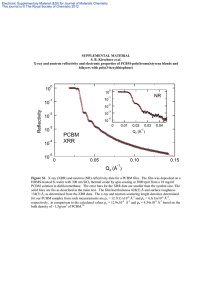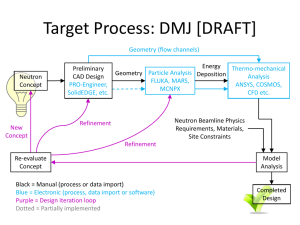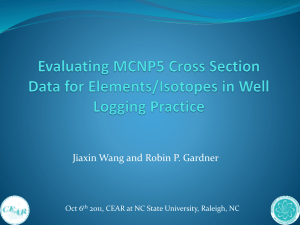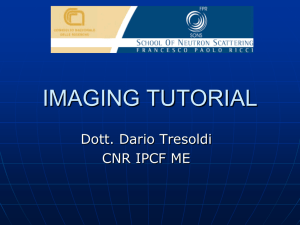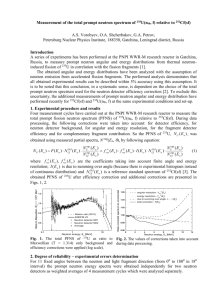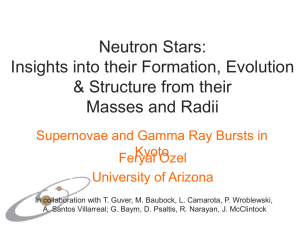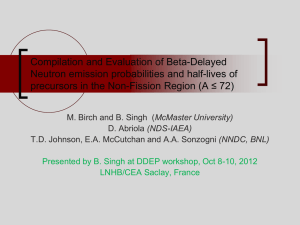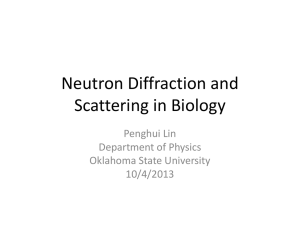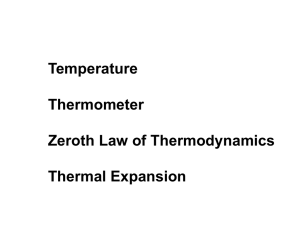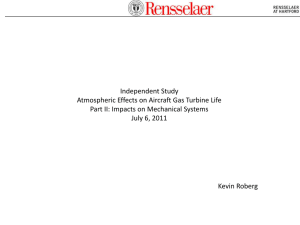MEG-OH OTS-OH Si/SiO 2
advertisement
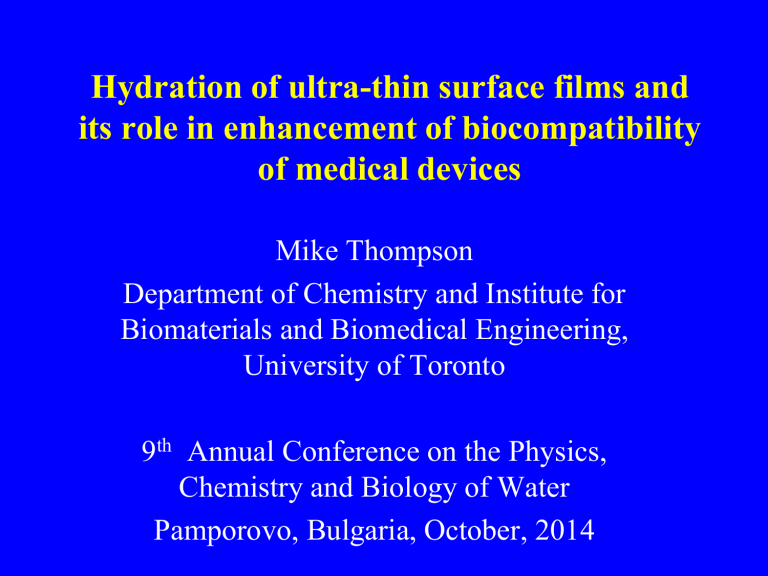
Hydration of ultra-thin surface films and its role in enhancement of biocompatibility of medical devices Mike Thompson Department of Chemistry and Institute for Biomaterials and Biomedical Engineering, University of Toronto 9th Annual Conference on the Physics, Chemistry and Biology of Water Pamporovo, Bulgaria, October, 2014 Topics • The core of our research – theranostics – combined therapy and detection • Fouling and the sensor–biological fluid interface • Link between fouling and biocompatibility • Anti-thrombotic surface chemistry • Role of surface hydration • Neutron reflectometry of ultra – thin film water • Anti-fouling / anti-thrombogenetic effect concerted mechanism involving structured water • Questions The Challenges of Critical Care Sick Patients Coagulopathy Inflammation Shock Organ Failure In-line theranostics and medical bypass circuitry Electromagnetic acoustic wave sensor Fouling of Quartz by Serum undiluted goat serum Sheikh, S.; Yang, D. Y.; Blaszykowski, C.; Thompson, M. Chem. Commun. 2012, 48, 1305 12 Surface Modifier Structure Head function Y Functionalizable for subsequent biomolecule immobilization Linkers for biosensors Alkyl: –(CH2)n– Oligoethylene glycol (OEG): –(O–CH2–CH2)n– Backbone Perfluoroalkyl: –(CF2)n– Anchoring function Substrate X Trichlorosilyl (Cl3Si), trialkoxysilyl ((RO)3Si), thiol (–SH), ... Quartz (piezoelectric), gold (electrical), stainless steel (implant), plastics (flexible), ... 5 Systematic Structural Modification 1/1 (v/v) H2O/MeOH room temp., overnight Sheikh, S.; Yang, D. Y.; Blaszykowski, C.; Thompson, M. Chem. Commun. 2012, 48, 1305 13 Antifouling Behaviour Through the use of structurally simple surface modifiers, the frequency shift due to the adsorption of goat serum was substantially reduced from ~ -31 kHz for bare quartz to less than -3 kHz for MEG-OH films Sheikh, S.; Yang, D. Y.; Blaszykowski, C.; Thompson, M. Chem. Commun. 2012, 48, 1305 14 BLOOD CONTACTING MEDICAL DEVICES Stents Extracor poreal Circuits Pacemaker P Blood Contacting Medical Devices Vascular Graft Hemodialyzer Econous Inc. July 2012 Blood interaction and bypass circuitry • Cardiopulmonary bypass (CPB) surgery is a common operation with Over 1 million yearly worldwide1 • Has several undesired consequences including blood coagulation • After surgery complications can occur for 20% for low risk patients with 12% result in multi organ dysfunction syndrome2 • Multi organ dysfunction syndrome has a mortality rate of 40%3 IBBME 1. Sphere medical statistics 2. Grover FL: . Ann Thorac Surg 1999;68:367-373; discussion 374-376. 3. Kollef MH, Wragge T, Pasque C:. Chest 1995;107:1395-1401. Biosensors Group Collagen Coated Polycarbonate surfaces MEG-OH coated Surfaces Bulk water Water density profile To investigate the hydration of ultra-thin films and gain insight into its anti – fouling mechanism. 1) Probe water density of water at MEG-OH and OTS-OH adlayers (normal to the surface) ‒ Examine interfacial water 2) Determine the effect of the internal ether oxygen atom on behaviour of water with adlayer How? Neutron reflectometry MEG-OH OTS-OH CNBC’s National Research Universal (NRU) Reactor • • • • Neutrons produced via fission of 235U (D2O moderator) Largest global producer of medical isotopes (60Co, 99Mo, 131I) > 85% neutron time to users (universities, research facilities) Applications: Structural chemistry, soft materials, thin films/interfaces (examples) Neutron Reflectometry (NR) D3 Neutron Reflectometer A neutron diffraction technique probing the specular reflectivity of surfaces and buried interfaces in layered systems Functions and Features • Structural and compositional information (e.g. oxide growth) • Atomic distribution (depth profiles) • High penetration depth • Film thickness (up to 200 nm) • Sensitive to 1H and 2H • Manipulation of contrast between media 6 Beam lines!!! Amplitude α ΔSLD Addition of layer (film) 9.42 x 10-6 Å-2 3.00 x 10-6 Å-2 2.07 x 10-6 Å-2 N+1 interfaces Air Cr d Si Kiessig fringes Kiessig fringes: Oscillations originate from constructive/destructive interference of reflected neutron waves • • Frequency depends on thickness of the layer Δq= 2π/d Amplitude depends on contrast between adjacent media (ΔSLD) - Enhanced sensitivity with increasing contrast Period of oscillation 1/α layer thickness (d) Surface Roughness z ks ko x θo θo j σj Dampened oscillations Diffuse scattering of neutrons ↓ R Si/SiO2 MEG-OH OTS-OH • Fringes on MEG-OH, OTS-OH reflectivity curves confirm presence of a ‘layer’ between SiO2 and CMW (interference of reflected neutron wave) • MEG-OH: dampened oscillations (low amplitude) • OTS-OH : sharper minima, oscillations with higher amplitude FIT REFLECTIVITY DATA WITH MODEL Reflectivity + Fits SLD Profile: 2-Phase Fit SiO2 Film Interfacial water Bulk Low SLD (organic coating Sample SLDSiO2 (x 10-6 Å-2) σSiO2 (Å) d1 (Å) SLD1 (x 10-6 Å-2) SLDB (x 10-6 Å-2) σB (Å) MEG-OH 3.67 14.3 21.7 2.97 3.66 16.5 OTS-OH 3.56 9.7 18.7 0.90 3.53 1.6 “Water Barrier”? BULK ------------- H H O H O H H H H O H H H H O O H H O H H H O H H H O H H O H 4Å H H H H O H H Si Si O O H not to scale O O Si O O H O O O O 6Å 5Å O Si O O O H O O O H H H O O O H O H O O H H H H H ------------- O O 22 Å O H H H H INTERFACIAL WATER H H O O H O H O H O O H O O H H O O H H H O H H O H H O H H H O H O O BULK O Si O O Si O O Si O O Si O O Si O O quartz quartz MEG-OH OTS-OH Si O O 17 Some questions • What is the origin of the myth that high quality SAMs reduce adsorption + fouling? • What is the precise role of the distal –OH in MEG-OH? • Why is the chemistry so “robust” in terms of antifouling / antithrombogenesis? • Can the surface chemistry lead to a quantum changes in medical device technology? • Does hydration play a role in biochemical interactive selectivity – e.g. cell signaling? Mike Thompson Research Group, October, 2014 Jack Sheng Dr. Sonia Sheikh Brian De La Franier Elaine Chak Kiril Fedorov Pat Benvenuto Dr. Chris Blaszykowski Dr. Larisa Cheran Victor Crivianu-Gaita Jenise Chen Niall Crawley Edmund Chan Ellie Wong Tairan Wang Rohan Ravindranath Ruben Machado Miguel Neves THANKS FOR LISTENING! mikethom@chem.utoronto.ca

